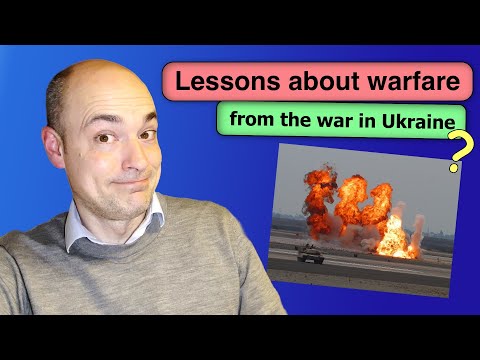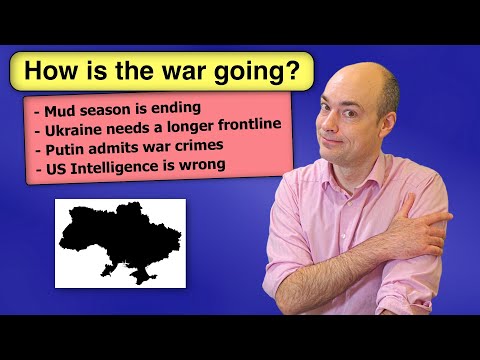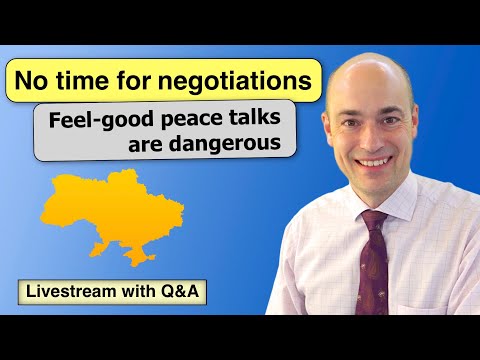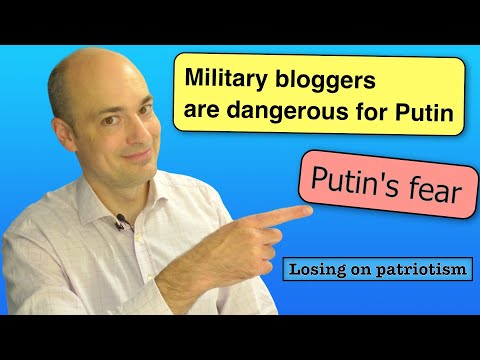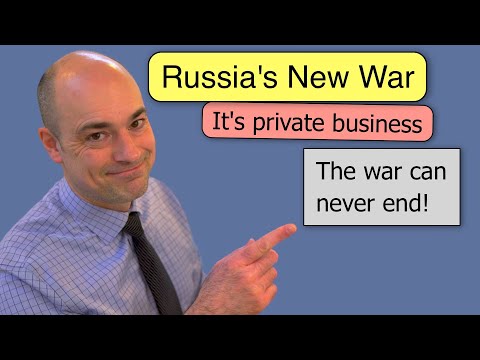I offer this article from CSP for consideration of what we all may be getting into as this Ukraine/Russia war continues.
What does CSP stand for in this context? The report comes from the Asian Times, so why “from CSP”?
Frank Gaffney’s website. I have followed him a long time for news on foreign affairs. He has been warning about China for decades.
So you followed a link from CSP to the report in the Asia Times?
And Frank Gaffney considers it reliable?
I am assuming that he considers the author, who is a senior fellow with the CSP to be reliable.
“If these prognostications on the two spring offensives are anywhere near correct – and there is plenty of evidence suggesting both offensives are being prepared – then Europe is on the brink of a great catastrophe.”
I have news for the writer of the article: a great catastrophe has already befallen Europe. There is war in Ukraine.
Prognostications on the military strategies in the “spring offensive” are fun for armchair generals. The talk of “NATO escalation” - the provision of more, perhaps better, weapons and weapons systems to Ukraine - is invariably to turn what is a war of attrition confined to Ukraine into a scare story of a “World War” of total annihilation all over the shop.
Why the Ukraine War is a continuing war of attrition and what are the military lessons we have learned from the war, strategically and tactically, are questions far more interesting and relevant to war decision-making than the promise of a really bad catastrophe by political strategists.
You might take a look at this Anders Puck Nielsen video, particularly with regard to the draw-down on ammo and weapons:
Nielsen update on the state of the war - December 2022:
Nielson on the view from the Russian side - Putin’s change of tune:
On peace talks:
There are other talks on the privatization of the war by warlords, including Putin.
So he’s a military analyst, and can academically analyze the strategies and equipment needed to defeat the Russians. No mention of the enormous loss of life for those caught in the middle of it.
He admits that it all depends on if the U.S. continues to supply Ukraine with the money and equipment necessary to continue fighting. Otherwise they would have no chance.
This is a “proxy” war that really is between the U.S. and Russia, with Ukraine doing the fighting.
Maybe the question is, can we wear Russia down before we run out of Ukrainians?
If the Russians outlast the Ukrainians, I guess that’s when we’ll have to start sending in American troops to fight. Then it will be a direct war between us, and we’ll lose American lives also.
We may then defeat Russia, but at what cost?
Ukraine will have become a “killing field”, of Ukrainians and Americans used as cannon fodder.
But no, it’s too soon for negotiations - that’s not good military strategy, says the academic analyst.
So lets just keep feeding more soldiers into the meat grinder.
Yes, I thought actual military analysis applied to an actual war might ground the discussion in reality. The peace map will be drawn according to territory held by either side.
Who is caught “in the middle” of this war? Do you mean Ukrainian civilians? Again, that is the reality of war. Putin made the calculation to kill civilians:
(This should have been linked to above.)
So Anders Puck Neilsen, come to “ground the discussion in reality,” is an actual military analyst and he covers what happened this past year. Does he get into what might happen as Spring begins, the mud and rain disappear and more countries in the vicinity make decisions for their own good as this war progresses?
I didn’t get far into either video. The man is just too happy.
You don’t say! Yes, thousands of soldiers and civilians dead, maimed, homeless, lives ruined, is “the reality of war”. But, it’s ok to keep it going because it’s all Putin’s fault, and we must defeat him at all costs.
No, we could have prevented the whole thing to begin with through negotiations, and all those dead Ukrainians would still be here. If they’d had a choice, which do you think they would have preferred - to have missed out on getting to join NATO, but still be alive, or to become a statistic while fighting Russia to the death?
I agree, but that time is, of course, in the past and didn’t happen and there is blame enough for all parties to account for its lack.
But that is not enough for a war to continue and escalate, consuming Europe in an even greater catastrophe than the current war there, which is what will happen as Spring Offensives work themselves out in real time.
So, go back to the negotiating table and continue or go all in for a bigger war and more destruction and death?
BTW, here is a bit on the author from The Asia Times: Stephen Bryen, Senior Fellow - Yorktown Institute
He isn’t some nobody, know-nothing.
Who is “keeping it going”? PUTIN. What will make him stop? Only an army.
To say that “we could have prevented the whole thing” is to say precisely nothing meaningful, or “helpful”. The war is on. The war is happening. The war is a fact. The war actually is an existential threat to Ukraine. Putin set out to kill, and kill he did. People will die for as long as Putin wages war.
The Ukrainians did have a choice. They chose to fight. They know the costs.
Do you not think you are infantilizing the Ukrainians? You continue to claim “we” could have prevented war by telling them (as we did in 2015?) that it would be better to give up their national independence and autonomy than to defend themselves against the Russian onslaught. This is fallacy, not made more coherent by your bewailing dead Ukrainians. “Oh! The humanity!” will not move Putin one inch out of Ukraine. Dressing up your demand for Ukrainians to surrender to a mass murdering war-lord as a deep humanitarian concern for their welfare is crocodilian humbug.
Negotiating peace by agreeing that Ukraine remain neutral, and not join NATO, is not “surrender” to Russia.
The war is real because we allowed it to become a reality by failing to use our power to stop it.
I’m not “infantilizing” the Ukrainians - they chose to fight, but they have no chance of winning unless the U.S. pays for it and supplies the weapons.
So that makes it our war, in which they are being used as proxies. As Meircheimer said, we “led them down the primrose path” by promising them membership in NATO, provoking Russia, and now they are suffering the consequences.
Jeanne,
Why do you assume that watching the Nielsen videos - in which he makes predictions, and readdresses them in light of subsequent events, empirically testing his analyses - will challenge your anti-war bias? He does indeed talk about Putin’s strategies to prolong the war. There is no special ingredient to a “spring offensive”. The same military thinking will apply in April of 2023 as it did in February 2022 in making strategic or tactical calculations. (See the “lessons learned” from the war video). You can watch his war analysis and still stick to your anti-war position at the end of it. That’s the beauty of fundamentalism: you can always claim you will not be persuaded to modify it.
Do you avoid looking at military analysis because you just want the war to go away? Do you think the war will just go away if the forum focuses on the prognostications of your somebody with 50 years experience in government, academia and industry? I did read his article - despite finding his combination of caution and panic deeply irritating, not to mention patronizing. In directing attention to Nielsen, I thought it might move the conversation to war-thinking, not anti-war-wishing. I do find it far more interesting to hear a military analyst discuss Putin’s war aims and relate them to the prosecution of the Ukraine war (which I remind you, is actually happening) than to read a bureaucrat explain to me all the ways that Putin might think that we (Americans) are going to war with him, and how a nuclear WW3 might happen.
Once again: What will Putin give in exchange for a Ukrainian promise not to join NATO? Will he withdraw? How much territory will he relinquish? And how would a promise not to join NATO prevent future incursions? After all, Ukraine was still not a member of NATO in February 2020, after it had been denied “fast track” processing in 2008. What the hell does Ukraine “remaining neutral” mean? And what can prevent Russia from unilaterally deciding that Ukraine has somehow breached its neutrality, justifying invasion by Russian neutrality enforcers.
Once again: How was it in our power to stop Russia’s annexation of Crimea? Sanctions? Nope. UN resolutions? Nope. Arming Ukraine? Yes, but we didn’t do it. France (?) brokered the MInsk Agreements, but the war carried on, despite them.
In 2022 the Ukrainians thwarted the Russian putsch on Kiev. That surprised the world. The US upped the materiel and monetary support after the win. Other countries have sent - or promised - support: The Czech Republic, Germany, Poland, Britain. But perhaps you should look at the Nielsen YouTube video where he discusses how Ukraine can win. Why, if Ukraine can beat Putin back, would nations also threatened by Putin not support Ukraine? Holding back would indeed reduce the chances of Ukraine winning, which is why the US and other nations are willing (for the time being) to support Ukraine’s defense. Denying Ukraine weapons because Ukraine would necessarily lose without them is not so much an infantilization of Ukrainians as it is a nullification of them.
To say that supplying Ukraine with weapons makes it “our war”, and Ukrainians merely our proxies is also a nullification of the Ukrainians and their wish for national survival. But to say that because it is our proxy war, we must end it by stopping the weapons- supply to the Ukrainians, so that it becomes once again the Ukrainian’s war which they will lose without those weapons, is pure tail-chasing - self-nullifying, or even self-infantilizing. It is not our proxy war. It is not even Ukraine’s war. It is Putin’s war.
Mearsheimer is all about validating his “offensive realist” theory. I have written about this at some length early last year on threads on the Ukraine war. Looking at the record with NATO, it is quite obvious that the powers that be in NATO fobbed off Ukrainian membership precisely because they were persuaded of the Mearsheimian doctrine of provocation. By postponing Ukrainian membership, they were deliberately not expanding NATO to Russia’s doorstep. Furthermore, after Putin invaded in 2022, all the humming and hawing about what weapons could be sent from which nation of origin, is because NATO and the US remain concerned with potential claims by Putin of provocation and direct confrontation.
The Ukrainians are not suffering the consequences of NATO provocation of Putin, they are suffering the consequences of NATO and US prevarication, which has kept them at a military disadvantage, without its own conventional deterrence, but also without being able to shelter under the NATO /US deterrence. Weakness is an invitation for aggression. Putin’s aggression is what the Ukrainians are suffering from, and will continue to suffer from, until he stops.
I did not get far into the Neilsen videos, because the young man is too damned happy. My bias only.
I will have to read the article again, but I did not get the same vibe that you did from it. So…I have read it again and reread it. I still don’t get where your ideas are coming from about how you suppose that I feel about this.
This is all I have been able to find on Neilsen:
I am a military analyst at the Royal Danish Defence College and have a background as a naval officer. This website is intended as a hub for my various projects and activities.
And another blurb: Born: 1979 (age 43 years), [Herlev, Denmark] Education: [Aarhus University] 2015-2017, also the Royal Danish Naval Academy. And he has a specialty in maritime operations and Russia.
But, this from his website was interesting to me, anyway:
Is he a good military analyst? Maybe. I do know that the CSP is filled with qualified people, whose concern is the defense of the US, that is, protecting US interests and assessing world affairs, which may affect that interest. They are all a bunch of old guys, with lots of experience of varying sorts in world affairs and in our government.
Should there be a sense of “panic” over the possibility that the US (and the West) could be dragged into a global war?
I am not fearful that Neilsen will “challenge my anti-war bias” nor do I have a anti-war fundamentalism…and to suggest that I do means that you are failing to understand my concerns that this is a war that must not be. I believe it is very important to end, because it is very dangerous to the world and much more so than WWI and WWII…even if it does not make that status.
You write:
Do you avoid looking at military analysis because you just want the war to go away? Do you think the war will just go away if the forum focuses on the prognostications of your somebody with 50 years experience in government, academia and industry?
Why do you insist upon insulting and belittling me, Claire? I started to not post this article, because of your continued assault on those, who do not agree completely with your assessment of everything concerning Ukraine and Russia, etc. But, I thought it was an interesting article that was worth considering.
“We need to de-escalate this dynamic. Nobody gains from a spiral of increasingly dangerous interactions…there is … substantial common ground for negotiations…”
I do agree with that, and I think it should be applied to the present stage of hostilities also.
Is there a time in any conflict when negotiations to end it should be abandoned?
I don’t reason that there is.
But imagine the possible outcomes if the Allies had agreed to negotiate with a Hitler request for negotiations in 1944!

